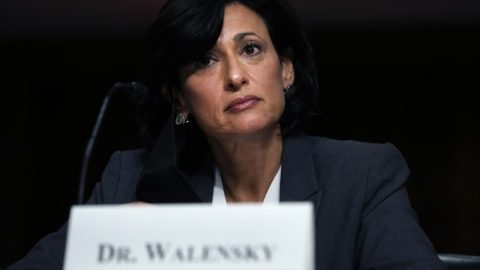
After losing and regaining the same 20-plus pounds more times than she could count, Anita Blanchard concluded that diets don’t work.
So when the University of North Carolina-Charlotte professor learned that Ozempic — developed to treat Type 2 diabetes — helped people lose weight and keep it off, Blanchard was determined to try it.
The state employee’s health insurance initially covered the prescription with Blanchard kicking in a $25 copayment. Over the next seven months, she said, she lost 45 pounds and lowered her blood pressure and cholesterol. The most significant benefits, though, were psychological.
“It stopped the food noise in my head, relieved my anxiety, and I was no longer drinking like a fish,” said Blanchard, now 60. “I’d have a glass of wine, and then that’s it.”
But North Carolina suffered from sticker shock as Blanchard shed pounds and thousands of others on the state insurance program — which covers more than 76,000 employees across 178 agencies, plus their dependents — tried to do the same. Ozempic and other glucagon-like peptide-1 (GPL-1) agonist medications accounted for 10% of the state employee health plan’s annual prescription drug spending, according to a North Carolina State Health Plan fact sheet. The state treasurer projected the class of drugs would cost the state more than $170 million this year, with costs jumping to more than $1 billion over the next six years.
“This exceeds the amount the State Health Plan spends on cancer, rheumatoid arthritis, and chemotherapy medications,” the State Health Plan said in a March statement.
The health plan’s board of trustees eliminated coverage of this class of medications for weight loss starting in April. The plan continues to cover the drug for Type 2 diabetes management.
But in a twist this August, a separate part of North Carolina’s government allowed the Medicaid program to start covering the drugs for weight loss — not just diabetes — for the state’s poorest residents, who are disproportionately affected by obesity and related diseases. The state’s Medicaid program covers more than 2 million people but doesn’t include state employees such as Blanchard.
And now the outgoing Biden administration wants to follow suit, proposing on Nov. 26 for the federal government to cover the medications to treat obesity or Medicaid patients nationwide, in addition to Medicare patients.
Still, the North Carolina coverage change left state employees like Blanchard facing a stark choice — stop taking what she views as a miracle drug or pay as much as $1,200 out-of-pocket each month.
“They know diets don’t work long-term for weight loss, yet they are denying coverage for a medication that has been effective,” Blanchard said. “It’s indicative of a profit-driven mindset that is more about cost savings than prioritizing patients’ health.”
The coverage switch highlights concerns about the cost of these medications and ongoing questions about who should get to have such drugs covered by insurance.
Several other states are also trying to reel in the expense of the medications. West Virginia canceled its pilot program to cover the drugs for its state employees. Connecticut state employees who are prescribed the drugs must participate in a clinical lifestyle management program.
The high prices have also raised concerns about the cost for other taxpayer-funded health care programs, such as Medicare. The Centers for Medicare & Medicaid Services estimated that coverage under the Biden proposal would cost about $40 billion over 10 years, including an extra $3.8 billion for states. But the requirement wouldn’t take effect until after President-elect Donald Trump takes office Jan. 20, giving his administration a chance to change it.
GLP-1 agonist medications, known by the brand names Ozempic, Trulicity and Wegovy, have proved to be effective for weight loss as well as managing Type 2 diabetes. They work by triggering the pancreas to release insulin, slowing the rate at which the stomach empties, increasing satiety and regulating appetite by sending signals to the brain to tell the body it is satisfied. But patients typically need to stay on the medications to maintain their weight loss, meaning they face long-term costs.
In clinical trials, patients taking Ozempic also showed significant reductions in cardiovascular problems such as heart attacks and strokes, even those without diabetes, or before weight loss started, said Duke University cardiologist and researcher Dr. Nishant Shah.
Making these drugs available through Medicaid is in the state’s long-term financial interest, said Kody Kinsley, secretary of the North Carolina Department of Health and Human Services, which doesn’t oversee the state employee health plan. Unlike private or employer insurance plans, the Medicaid program receives generous rebates on these types of drugs, significantly reducing the cost, he said.
Calling North Carolina the buckle of the “Barbecue Belt,” Kinsley noted that state’s obesity rate exceeds the national average. The latest analysis from NORC research organization at the University of Chicago showed that 45% of adults in the state had a body mass index above 30, the threshold for clinical obesity, compared with 42% nationwide. That number was 55% for non-Hispanic Black adults in the state.
In addition, Kinsley said, with Medicaid the primary payer for long-term care, covering the drugs helps Medicaid’s bottom line by reducing the need for nursing home care often driven by unmanaged chronic diseases.
“We’re trying to put our dollars where they will lower costs in the long run,” he said. “I spend almost a billion dollars a year on obesity-related diseases. If I can reduce that spend by even 1%, then these drugs are a no-brainer.”
But what about people who aren’t on Medicaid? Duke’s Shah said the U.S. health care system needs to eliminate hurdles that make it difficult to obtain the drugs. Besides making the medication more affordable, he said, it should encourage the use of weight loss drugs and treatment of obesity as a chronic disease instead of stigmatizing it as a moral failing.
“Whether it is drug cost, conditions that require the payer to approve them, the patient’s health insurance plan, or the unaffordability of a plan that would cover weight loss, there are real-world barriers in our health care system,” Shah said.
Family medicine physician Dr. Melissa Jones of Charlotte said she has often seen a bias against people in her weight management practice when they try to get these medications covered by private insurance.
“There’s no shame in saying ‘I have high blood pressure’ or ‘I inherited this condition from my family,’” Jones said. “But for some reason, there’s shame associated with saying, ‘I struggle with my weight.’”
Although Blanchard can’t get her Ozempic covered anymore as a state employee, a concierge doctor gave her a prescription for a nonbrand version of the anti-obesity medications from a compounding pharmacy, available for now because of shortages of the brand-name versions. Though she believes it is less effective, she pays $225 a month for it.
“I can handle that,” she said.










Recent Comments